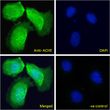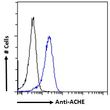Acetylcholinesterase (ACHE) Goat Polyclonal Antibody
USD 436.00
USD 200.00
USD 867.00
Specifications
| Product Data | |
| Applications | FC, IF, WB |
| Recommended Dilution | ELISA: 1:64,000. WB: 0.3-1µg/ml. |
| Reactivities | Human (Expected from sequence similarity: Mouse, Rat, Cow) |
| Host | Goat |
| Isotype | IgG |
| Clonality | Polyclonal |
| Immunogen | Peptide with sequence QFDHYSKQDRCSDL, from the C Terminus of the protein sequence according to NP_000656.1. |
| Formulation | Supplied at 0.5 mg/ml in Tris saline, 0.02% sodium azide, pH7.3 with 0.5% bovine serum albumin. |
| Concentration | lot specific |
| Purification | Purified from goat serum by ammonium sulphate precipitation followed by antigen affinity chromatography using the immunizing peptide. Supplied at 0.5 mg/ml in Tris saline, 0.02% sodium azide, pH7.3 with 0.5% bovine serum albumin. Aliquot and store at -20°C. Minimize freezing and thawing. |
| Conjugation | Unconjugated |
| Storage | Store at -20°C as received. |
| Stability | Stable for 12 months from date of receipt. |
| Gene Name | acetylcholinesterase (Cartwright blood group) |
| Database Link | |
| Background | Acetylcholinesterase hydrolyzes the neurotransmitter, acetylcholine at neuromuscular junctions and brain cholinergic synapses, and thus terminates signal transmission. It is also found on the red blood cell membranes, where it constitutes the Yt blood group antigen. Acetylcholinesterase exists in multiple molecular forms which possess similar catalytic properties, but differ in their oligomeric assembly and mode of cell attachment to the cell surface. It is encoded by the single ACHE gene, and the structural diversity in the gene products arises from alternative mRNA splicing, and post-translational associations of catalytic and structural subunits. The major form of acetylcholinesterase found in brain, muscle and other tissues is the hydrophilic species, which forms disulfide-linked oligomers with collagenous, or lipid-containing structural subunits. The other, alternatively spliced form, expressed primarily in the erythroid tissues, differs at the C-terminal end, and contains a cleavable hydrophobic peptide with a GPI-anchor site. It associates with the membranes through the phosphoinositide (PI) moieties added post-translationally. [provided by RefSeq] |
| Synonyms | ACEE; ARACHE; N-ACHE; YT |
| Reference Data | |
| Protein Families | Druggable Genome |
| Protein Pathways | Glycerophospholipid metabolism |
Documents
| Product Manuals |
| FAQs |
| SDS |
{0} Product Review(s)
Be the first one to submit a review






























































































































































































































































 Germany
Germany
 Japan
Japan
 United Kingdom
United Kingdom
 China
China





